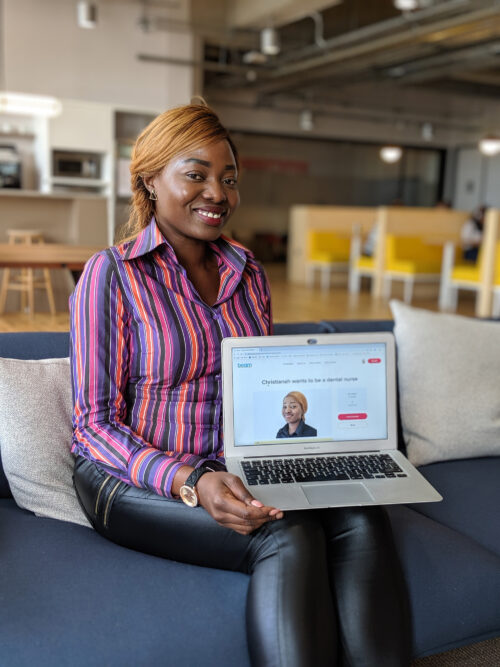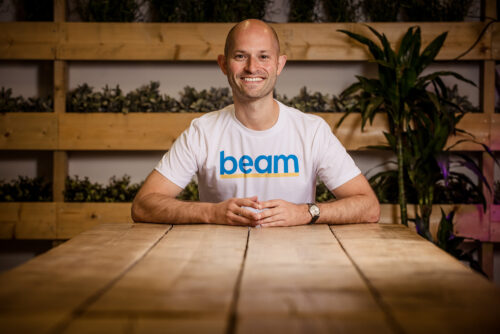
Alex Stephany: Measuring positive impact over profit
Nov 2022
What sparked your idea for Beam?
Five years ago, I got to know a homeless man outside my local Tube station in North London. I’d buy him cups of coffee and pairs of socks when it was getting cold. At one point, he disappeared for weeks on end. When he reappeared, he looked years older: he told me he’d had a heart attack and had just come out of hospital. For all the well-meaning gestures from myself and no doubt others, he was in a worse position than ever.
So I began to ask myself what it would take to make a lasting difference to this man’s life. He had been out of work for years. For me, the answer lay in empowering him with the skills, confidence and support needed to sustainably support himself. Of course, that would cost far more than coffees or socks - but what if everyone chipped in?
That’s when the idea of “crowdfunding” employment training for homeless people was born. Over the following months, I co-developed the model working with homeless people and charities, and launched Beam in October 2017.
The main difference in growing a positive impact business is that you’re focused on social or environmental metrics, rather than financial metrics. In Beam’s case, this is the number of homeless people who move into stable jobs and homes. Our financial success is directly linked to the number of people we support - the more people we support, the more we grow as a business.

What 3 things would you say have been integral to Beam’s success?
Our team - I’m lucky to work alongside some of the kindest, smartest and values-driven people I’ve ever met. We’ve built a really strong culture at Beam and we’re proud to be rated a top company to work for by Escape the City and The Dots. If you’re reading this and want to join us, check out our open roles.
Our partners - we’re partnered with more than dozens of fantastic charities and 30 plus forward-thinking local councils across the UK who fund Beam’s work. As we grow, we want to be the go-to employment service for the government - radically reducing unemployment and creating equality of opportunity.
Our tech - Beam is building groundbreaking tech that is every bit as good as Spotify and Netflix, but for the most disadvantaged people in society. This has enabled us to scale Beam rapidly and help many more people than we thought possible.
I’ve heard you mention that you knew very little about the charity/homelessness sector before starting Beam. What advice would you give to someone who similarly has a business idea they’re really passionate about but doesn’t have a lot of knowledge of the sector?
I've had several quite unique experiences that led to the founding of Beam:
- Learnt about marketplaces by running one of the largest venture-capital backed marketplaces in the UK, JustPark
- Learnt about crowdfunding by running what was the largest ever crowdfunding campaign for a tech startup - and realising it could be used for far more social ends
- Learnt about collaborative models by writing a book on the sharing economy and advised the Mayor of Seoul on how collaborative platforms could solve major problems
But while all of this experience was invaluable, I knew very little about homelessness. Fortunately, I met my incredible cofounder Seb Barker in the early days of building Beam. We shared similar values, but our careers could barely be more different. I’d been running a tech company, while Seb was working for the NHS after years working in homelessness. Today, I think of him as the most incredible cofounder I could ever have found. We could only create Beam by combining experience from wildly different professional worlds.
I often think about what would happen if more people working in tech collaborated with people who'd never worked a day in tech, and how many more problems we could solve. That’s been our approach at Beam from day one when we set out to build a platform that was super collaborative and allows everyone in the ecosystem to play to their strengths.
Finally, go out and meet with and listen to the people you’re trying to positively impact. Back when Beam was getting started, we spent over six months building the model with the input of people who had experienced homelessness and a group of London-based charities.
Transparency is something we’ve become more demanding of from businesses; wanting details on how our data is kept and used or how our money is being spent. If there’s a charitable element to a business, I imagine that pressure’s heightened. How do you uphold and execute on that value?
One of our core values is that “we’re open and transparent”. We strive to be the most open and transparent organisation working in social impact, because that keeps us accountable. Openness and transparency also helps us build trust with the world and each other while facilitating collaboration. Internally, we run “Transparency Sessions”, a space for employees and their managers to give feedback and outline plans for future growth. In these sessions, we have three core principles: we’re open and honest, we care personally, and we challenge directly.
When someone gives to Beam, they can see exactly how their donation has impacted a life. Each homeless person’s crowdfunding campaign has a detailed budget breakdown - including travel costs and childcare - so that supporters can see the exact barriers they’re removing. We also share our impact data publicly on our Transparency Dashboard, which has over 100 live data points on everything from the number of people we’ve supported, to the total amount raised. This is about giving supporters unprecedented insight into how they’re making a difference.
Being transparent means also being honest when things don’t go the way you planned. Often the people Beam works with experience difficult lives, and these do not disappear when they come to Beam. Instead, we believe by offering new opportunities and the right support, homeless people can take that all-important step into a stable job and home. But sometimes a person’s situation changes and it’s in their best interests to end their journey with Beam. When someone withdraws from Beam’s service, we also share this transparently on our dashboard. Fortunately, this doesn’t happen often, with around 85 per cent of people completing their journey with Beam.

What’s been your biggest Lesson Learned?
One of the biggest lessons I’ve learned is that we can solve bigger, harder problems sooner than we often think possible through the power of collaboration. One of our values at Beam is ‘We Beam’ - we’re proud optimists’. Even with a problem like homelessness, we think there’s reason to be optimistic. And working with the extraordinary people using Beam to move forward with their lives reminds us of that every day.
Join 5,000 other founders
Get our monthly startup roundup via email, featuring guides, podcasts and resources.

Educational content just for startups. As a member, you’ll get unlimited access to an extensive range of guides, blogs and advice to help you run and grow your business.